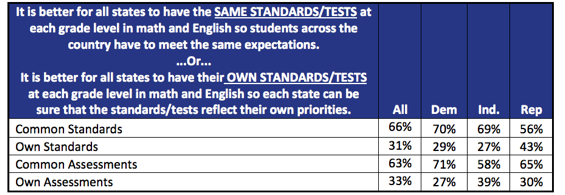All students should graduate from high school ready for college, careers, and citizenship.

In just a few short years, the education landscape has changed dramatically due to a sweeping set of policy changes and reform initiatives, perhaps none more transformative than the Common Core State Standards (CCSS). Since their release in June 2010, 45 states and Washington, D.C. have chosen to adopt these common, K-12 English Language Arts/Literacy and Mathematics standards to provide all students with the academic foundation they need for success in college, careers and life.
Despite the number of states that have voluntarily adopted the new standards—set to be implemented by 2014-15—the question remains: what does the public think about the Common Core State Standards? Or, perhaps the harder question: will the public support the Common Core as states move forward on their implementation plans, including, for many, the likely adoption of assessments aligned to the Common Core?
Achieve's recently-commissioned national poll of voters and K-12 educators—Strong Support, Low Awareness: Public Perception of the Common Core State Standards—sought to answer these questions and found that while both the public and educators strongly support the notion of all states having common standards, there is low awareness, especially among the general voting public, of the Common Core State Standards.
Major findings from the nation-wide survey include:
- Generally, public education is considered to be a very or extremely important issue to voters across the board. However, only about one in ten voters—and educators—believe public education is working pretty well right now.

- The Common Core State Standards are in the early stages of implementation and awareness among the general public is very low; only 19% of voters have seen, read and/or heard anything about the Common Core. Awareness among teachers is significantly higher, likely because of states' and districts targeted outreach and professional development initiatives.
- Among the few voters who are aware of the Common Core State Standards, there is a mixed impression of the CCSS, with essentially the same percentage having a favorable and unfavorable view. Among teachers who are aware of the Common Core, there is generally a more favorable view. When more details on the CCSS are given, support rises significantly.
- There is strong support for common assessments among voters, but also disagreement as to how the results of the assessments should be used. The general public strongly supports using the results for a full range of accountability purposes, while teachers are more skeptical of using test results for such purposes. For example, at least three-quarters of voters said it was acceptable to use test data for holdings districts, schools or teachers accountable. Among teachers, a slim majority (51%) believe it is acceptable to use test results to hold districts and school accountable, but only 39% believe this data should be used for teacher accountability.

Strong Support, Low Awareness: Public Perception of the Common Core State Standards demonstrates how critical it is for state and district leaders and advocates to redouble their communications efforts to increase awareness and understanding of the Common Core State Standards, common assessments and related policies—and prepare the public for what the education landscape will look like over the next few years. For tips, download "Common Core State Standards Communications & Outreach."
To view the survey results (either in PowerPoint or report form) see, www.achieve.org/publicperceptionccss.
